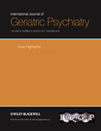Heavy/binge drinking and depressive symptoms in older adults: gender differences
Abstract
Objectives
The purpose of this study was to examine gender similarity/difference in the association between depressive symptoms (11-item Center for Epidemiologic Scale for Depression (CES-D) scores), on the one hand, and frequency and amount of alcohol use, on the other, among older adults.
Methods
Data came from the National Social Life, Health, and Aging Project (NSHAP), Wave 1, which included a nationally representative probability sample (n = 2924) of community-dwelling individuals aged 57–85. Heavy/binge drinking was defined as the consumption of 4+ drinks for men and 3+ drinks for women per drinking day. The relationship between CES-D scores and the frequency and amount of alcohol consumption was tested using gender-separate, 2-step ordinary least squares (OLS) regression analyses.
Results
A significant proportion of both men (67.7%) and women (52.2%) had consumed alcohol in the preceding 3 months, and 12.3% of male and 8.4% of female drinkers were heavy/binge drinkers. Substantial differences between male and female heavy drinkers were found in sociodemographics, health status, and social support and social engagement. Regression results show that both frequency of drinking and heavy/binge drinking, as opposed to abstinence, were significantly positively associated with men's CES-D scores, but not with women's.
Conclusion
Heavy/binge-drinking older men may use alcohol to cope with depressive mood, and heavy drinking might also contribute to their social isolation and depressive symptoms. Depression screening and treatment for older men should be accompanied by alcohol screening and treatment and vice versa. Copyright © 2010 John Wiley & Sons, Ltd.




